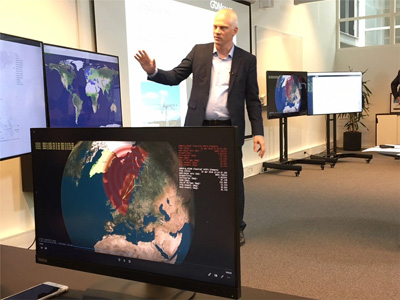As part of a mission to demonstrate interlink communication on nanosatellite tandem formation flights and data retrieval, including surveillance of the Arctic area, the Danish nanosatellite specialist GomSpace launched two nanosatellites in February. Twelve weeks later, GomSpace for the first time showed the possibility of live data capture from the two nanosatellites in space at a press conference held in Aalborg, Denmark. At the same time, the press conference marked the official transition to the so-called demonstration phase, following the mission's test phase. The latter has thus been successfully completed, and the mission is now ready to carry out its scheduled tasks.
On February 2, 2018, GomSpace launched two nanosatellites mounted on the Chinese missile Long March 2D from a launch station in the Gobi Desert. The objective of the two nanosatellites, based on GomSpace's 6U platform, is in part to monitor the Arctic area. It is an area where ice has melted significantly in recent years, meaning that the area sees more and more activity in the shape of aircraft and ships, researchers and tourists. GomSpace nanosatellites are optimally designed for such purposes as they can fly in tandem formation and thus cover a very large geographical area. The price per nanosatellite is very competitive, and the full coverage of nanosatellite formations is significantly higher compared to large, traditional billion-dollar satellites, making it economically feasible for a country like Denmark to add even more nanosatellites to the monitoring of the Arctic area.
GomSpace has built the satellites and is responsible for their operation, and at the press conference in Aalborg, the company demonstrated a historic live data transmission during which the orbiting satellites communicated with a ground station in Aalborg. Since the launch of satellites in February, GomSpace's technical team has been testing the two satellites' various subsystems to ensure optimal communication and data capture. The two nanosatellites, currently flying in orbit at a height of 500 kilometers, shoot a speed of 7.5 kilometers per second and the high speed means that there are only three "windows" per day during which GomSpace can retrieve the data recorded by the nanosatellites. The data are images and signals from ships and aircrafts and as successfully demonstrated at the press conference, this retrieval process went according to schedule, and the satellites can send both images and data signals down to Earth.
As part of the project, GomSpace and the European Space Agency (ESA) have signed a contract that includes design, production, integration, launch and operation of one of the two satellites, and ESA was also present at the press conference in Aalborg.
"The GOMX-4B satellite is our most advanced satellite design to date, and we are pleased that ESA participates in a project which, for the first time, shows how to exploit the benefits of satellite tandem formation. The platform and technology have a lot to offer to our customers and we therefore expect a lot of commercial potential moving forward. This is definitely the next-generation satellites", states Niels Buus, CEO of GomSpace.
The satellites are based on GomSpace's 6U platform and measure 20 cm x 30 cm x 10 cm and weigh about eight kilos. The satellites are launched into the correct orbit, and the historic mission will show how two satellites can be connected both during the launch and orbit phase. The formation flight allows satellite coverage across the globe at a fraction of the traditional costs, while also allowing ground stations to track data from aircrafts and ships, and it furthermore paves the way for radio communication between two geographical locations.

